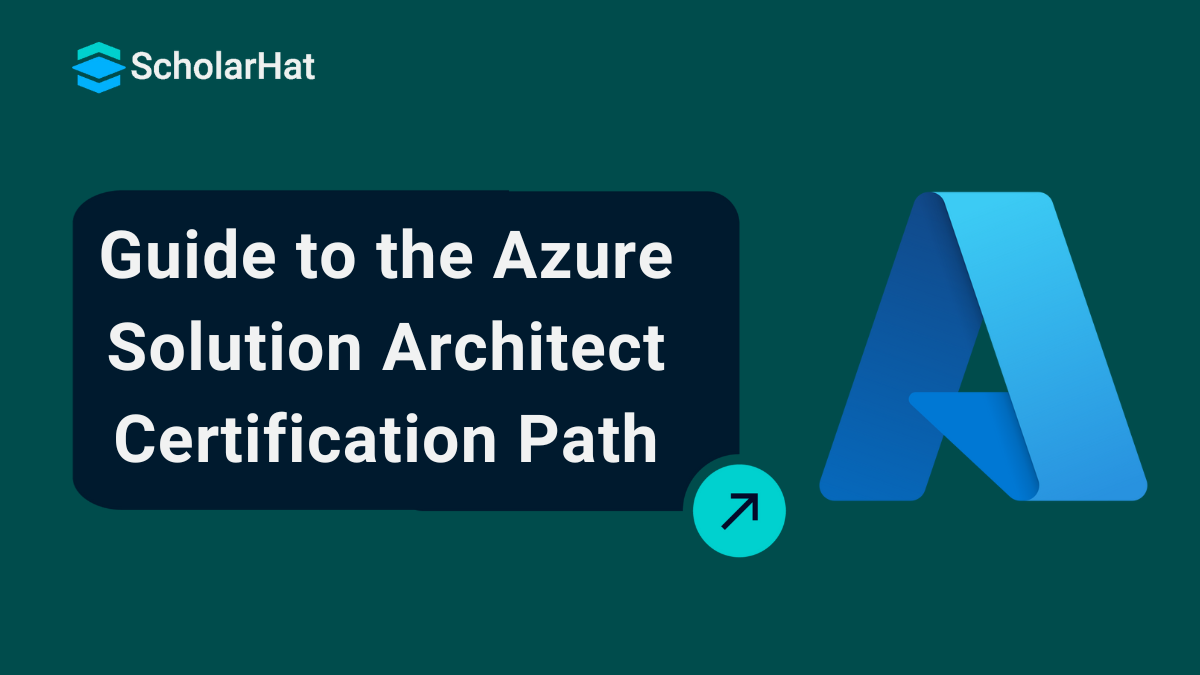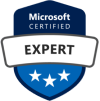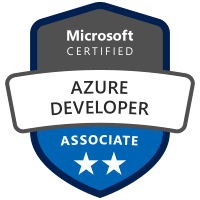18
AprAzure Solution Architect Certification Path: A Complete Guide
So, you’re thinking about becoming an Azure Solution Architect? Great choice! With businesses rapidly moving to the cloud, skilled architects are in high demand. But how do you get certified? What’s the best path to follow?
Don’t worry—you’re in the right place! This Azure Tutorial guide will walk you through everything you need to know about the Azure Solution Architect Certification Path, including:
What an Azure Solution Architect actually does?
- Why getting certified is worth it
- The prerequisites for the AZ-305 exam
- The key skills you’ll need to master
- Career opportunities after certification
What Does an Azure Solution Architect Do?
An Azure Solution Architect designs and oversees cloud-based solutions using Microsoft Azure. Their key responsibilities include:
- Architecting scalable and cost-efficient Azure solutions.
- Optimizing cloud services for performance and security.
- Ensuring compliance with security and regulatory standards.
- Integrating on-premises systems with Azure.
- Continuously improving cloud architecture using best practices
| Read More: |
| Top 50 Azure Solution Architect Interview Questions |
Why should you pursue Azure Solution Architect Certification?
By confirming your expertise in developing and executing solutions on Microsoft Azure, earning the Azure Solution Architect Certification can boost your reputation and provide you access to higher-paying positions. It gives you the tools to maximize cloud initiatives, enhance security, and cut expenses, which makes you an invaluable resource for businesses.
Here are several reasons that show the importance of Azure Solution Architect Certification:
- High Demand: Azure Solution Architects are in demand as businesses adopt cloud technologies.
- Career Advancement: Opens doors to senior-level roles in cloud architecture and engineering.
- Competitive Salaries: Certified professionals typically earn higher salaries than non-certified peers.
- Comprehensive Knowledge: Deepens your understanding of Azure services, security, and best practices.
- Global Recognition: Microsoft certifications are recognized worldwide, boosting your professional reputation.
- Hands-on Skills: The certification process ensures you gain practical skills for real-world challenges.
Skills Required to Become an Azure Solution Architect
To become an Azure Solution Architect, the most important skills required are:
- Azure Services Mastery: Deep knowledge of Azure architecture, including IaaS, PaaS, and SaaS services.
- Networking & Security: Expertise in virtual networking, Azure firewalls, VPNs, and security protocols within Azure.
- Data Solutions: Proficiency in Azure databases, data storage, backup, and disaster recovery.
- DevOps & CI/CD: Experience with Azure DevOps, continuous integration, and deployment pipelines.
- Cost Optimization: Ability to design cost-effective, scalable Azure solutions while managing budgets.
- Automation & Scripting: Skill in automating infrastructure using tools like Azure Resource Manager (ARM) templates or Terraform.
- Communication & Leadership: Ability to collaborate with teams and stakeholders and guide them through Azure solution implementations.
Prerequisites for the AZ-305 Exam
The AZ-305: Microsoft Azure Solutions Architect Expert exam requires a solid understanding of Azure architecture and services. Here are the key prerequisites:
1. Experience with Microsoft Azure
- Hands-on experience with core Azure services (compute, storage, security).
- Ability to implement and manage Azure solutions.
2. Foundational Knowledge:
- Strong understanding of cloud computing concepts.
- Familiarity with Azure tools like Azure Resource Manager (ARM).
3. Experience with Azure Administration and Development
- Skills in managing Azure workloads and automating processes.
- Experience with networking, databases, and Azure DevOps tools.
4. Understanding of IT Operations
- Knowledge of networking, virtualization, and disaster recovery.
- Experience in security, identity management, and business continuity.
5. Prior Certification (Recommended but Not Mandatory)
- AZ 104 certification provides foundational knowledge.
- Helps in understanding Azure infrastructure management.
6. Design Skills
- Ability to design scalable, efficient cloud solutions.
- Knowledge of hybrid cloud and migration strategies.
7. Azure Architect Role
- Experience designing cloud solutions balancing cost, performance, and security.
- Strategic decision-making for optimizing services.
8. Study Resources
- Use Azure documentation and Microsoft Learn for guidance.
- Practice with hands-on labs and mock exams.
Skills Measured in the AZ-305 Exam
The AZ-305: Microsoft Azure Solutions Architect Expert exam measures a range of skills related to designing and architecting Azure solutions. Here’s a breakdown of the core skills measured:
1. Design Identity, Governance, and Monitoring Solutions (25-30%)
- Design solutions for identity and access management (Azure AD, RBAC).
- Plan governance strategies (Azure policies, blueprints).
- Design monitoring solutions (Azure Monitor, Log Analytics).
2. Design Data Storage Solutions (20-25%)
- Design a data storage strategy (SQL, Cosmos DB, Blob storage).
- Plan for data security, backup, and disaster recovery.
- Optimize databases for performance and scalability.
3. Design Business Continuity Solutions (10-15%)
- Design backup and disaster recovery solutions (Azure Backup, Site Recovery).
- Implement high availability (availability sets, zones).
- Plan for fault tolerance and data replication.
4. Design Infrastructure Solutions (25-30%)
- Design networking solutions (virtual networks, DNS, load balancing).
- Plan compute resources (VMs, containers, App Services).
- Optimize infrastructure for performance, cost, and security.
How to Prepare for the AZ-305 Exam
To prepare effectively for the AZ-305: Microsoft Azure Solutions Architect Expert exam, follow these steps:
1. Understand the Exam Objectives
- Review the AZ-305 skills outline to grasp key areas like governance, data storage, and infrastructure.
- Focus on designing identity, continuity, and network solutions.
2. Gain Hands-On Experience
- Practice with core Azure services like Azure AD, Virtual Machines, and Azure Storage.
- Work on designing real-world Azure solutions in a lab environment.
3. Study Resources
- Utilize Microsoft Learn modules and official Microsoft Docs for in-depth study.
- Explore architecture best practices and solutions design principles.
4. Take Practice Exams
- Use practice tests from MeasureUp or Whizlabs to gauge your readiness.
- Familiarize yourself with the exam format and question types.
5. Join Study Groups/Forums
- Participate in Azure study groups or forums to exchange tips and clarify doubts.
- Attend webinars and tutorials focused on Azure architecture and exam preparation.
6. Plan Your Study Schedule
- Set a study schedule that breaks down topics by exam domain.
- Prioritize hands-on labs and mock exams close to the test date.
7. Focus on Real-World Scenarios
- Understand real-world scenarios like scaling services, securing identities, and designing fault-tolerant systems.
- Focus on use cases where you can apply Azure design principles effectively.
Challenges and Solutions in Becoming an Azure Solution Architect
Here are some common challenges faced while becoming an Azure Solution Architect and their solutions:
1. Challenge: Mastering a Wide Range of Azure Services
Solution
- First, focus on core Azure services, such as computing, storage, networking, and security. Gradually expand your knowledge to specialized services.
- Use Microsoft Learn and hands-on labs to gain experience across services and develop a strong foundational understanding.
2. Challenge: Keeping Up with Rapid Azure Updates
Solution
- Stay updated by following Azure blogs, release notes, and Microsoft Tech Community announcements.
- Set aside time weekly to review new features and services introduced in Azure and adjust your knowledge accordingly.
3. Challenge: Balancing Cost, Performance, and Security
Solution
- Learn to design cost-effective solutions by leveraging features like auto-scaling, reserved instances, and optimizing resource allocation.
- Study best practices for Azure security, including identity management (Azure AD), encryption, and network security configurations.
4. Challenge: Designing for Business Continuity and Disaster Recovery
Solution
- Understand and implement Azure backup, site recovery, and availability zones to ensure high availability and disaster recovery.
- Practice designing fault-tolerant architectures with real-world scenarios to improve your ability to plan for business continuity.
5. Challenge: Acquiring Hands-On Experience
Solution
- Build test environments in Azure to apply your learning and complete hands-on labs available in learning platforms.
- Work on real-world projects or contribute to open-source projects to deepen your experience in designing Azure solutions.
Career Growth After Azure Solution Architect Certification
1. Top Roles After Certification
- Azure Solutions Architect: Design and implement Azure solutions tailored to business needs.
- Cloud Consultant: Provide expertise to organizations in adopting and optimizing cloud strategies.
- Cloud Infrastructure Engineer: Manage and maintain cloud infrastructure for optimal performance and reliability.
2. Salary Expectations and Industry Demand
- Salaries for certified professionals typically range from ₹15–30 LPA in India and $120,000–160,000 annually in the US.
- High demand for Azure-certified roles due to increasing cloud adoption across industries.
- Organizations prioritize certifications, leading to better job prospects and advancement opportunities.
3. Continuous Learning and Advanced Certifications
- Stay updated with evolving cloud technologies through continuous learning and training.
- Pursue advanced certifications like Azure DevOps Engineer Expert for specialization.
- Engage in hands-on labs, workshops, and webinars to enhance practical skills and knowledge.
Why Companies Hire Azure Solution Architects?
Companies hire Azure Solution Architects for several key reasons, primarily related to the complex needs of cloud-based infrastructures and services. Here are some of the main reasons:
1. Expertise in Azure Cloud Architecture
Azure Solution Architects have in-depth knowledge of Microsoft Azure services, which allows them to design, implement, and manage solutions that are scalable, secure, and cost-effective. As Azure is one of the leading cloud platforms, businesses require professionals with specialized skills to optimize their cloud strategies.
2. Business-Centric Cloud Solutions
They can align cloud technologies with business goals, ensuring that the cloud solutions are not only technically sound but also meet specific organizational needs such as performance, reliability, and cost-efficiency.
3. Cost Management and Optimization
Azure Solution Architects help organizations optimize their cloud costs, avoiding over-provisioning of resources. They design cloud infrastructures that are efficient, balancing performance with budget considerations, which is critical for long-term cost management.
4. Security and Compliance
With increasing data regulations, companies need to ensure their systems comply with security and regulatory standards. Azure Solution Architects are familiar with Azure's security features and can design solutions that meet industry compliance requirements, such as GDPR, HIPAA, and others.
5. Migration to the Cloud
Many organizations are shifting from on-premises data centers to the cloud. Azure Solution Architects play a critical role in migrating legacy applications and data to Azure, ensuring minimal downtime and proper integration with existing systems.
Future Trends in Azure Solution Architecture
The integration of Artificial Intelligence (AI) and Machine Learning (ML) into Azure solution architecture is transforming how cloud solutions are designed, deployed, and managed. Here are some key future trends:
1. AI-driven automation in Cloud Operations
- Trend: AI and ML will increasingly automate routine cloud operations such as resource provisioning, workload management, and scaling.
- Impact: This will lead to more autonomous cloud environments where predictive analytics and AI-based insights optimize resource usage and minimize manual intervention.
- Example in Azure: Azure's Machine Learning Operations (MLOps) streamlines the process of deploying and managing machine learning models, enhancing both development and operational efficiency.
2. Enhanced Security with AI and ML
- Trend: AI and ML will enhance security in Azure architectures by predicting and mitigating potential threats, identifying anomalies in real time, and automating incident responses.
- Impact: This will lead to more resilient cloud architectures that can proactively guard against evolving cybersecurity threats.
- Example in Azure: Azure Security Center and Sentinel are leveraging ML for threat detection, security incident management, and response automation.
3. AI and ML-optimized Data Architectures
- Trend: The demand for real-time data processing and analysis will push cloud architectures toward the integration of advanced data pipelines and AI/ML capabilities.
- Impact: AI/ML models will be embedded in data pipelines, allowing for real-time analytics, forecasting, and decision-making within the architecture.
- Example in Azure: Azure Synapse Analytics combines big data and data warehousing, allowing AI and ML models to be embedded directly within data workflows for more predictive insights.
4. Serverless AI Integration
- Trend: Serverless computing models will support AI and ML deployments, making it easier to run intelligent applications without managing infrastructure.
- Impact: AI-driven applications can scale dynamically, optimizing costs and improving application responsiveness.
- Example in Azure: Azure Functions integrates with Azure Cognitive Services and ML models to enable serverless AI applications that run on-demand without infrastructure overhead.
5. AI-Assisted Application Development
- Trend: Azure's development tools will increasingly integrate AI to assist developers in building, testing, and deploying cloud-native applications.
- Impact: The development lifecycle will become more efficient, with AI-based code suggestions, error detection, and performance optimizations embedded directly into IDEs and CI/CD pipelines.
- For example, in Azure, GitHub Copilot, now integrated with Azure DevOps, uses AI to assist developers by suggesting code snippets and optimizing workflows.
Conclusion
In conclusion, you have explored the Azure Solution Architect Certification path, a vital step for IT professionals aiming to master the skills required to design and implement secure, scalable, and efficient cloud solutions. This certification not only enhances your technical expertise but also positions you as a sought-after professional in the rapidly evolving world of cloud computing. Ready to accelerate your career? Enroll in the Azure Solution Architect Certification or the Azure DevOps Certification Course today and unlock your potential to lead in cloud innovation. Let’s get you certified!
FAQs
Take our Azure skill challenge to evaluate yourself!

In less than 5 minutes, with our skill challenge, you can identify your knowledge gaps and strengths in a given skill.








